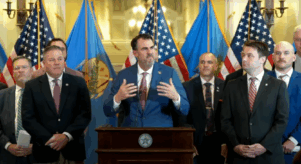 With a little more than two weeks left in the legislative session, Governor Kevin Stitt and Legislative Leaders have reached an agreement on a $12.59 billion budget for Fiscal Year 2026. That’s less than a one percent increase in spending compared to the current state budget.
With a little more than two weeks left in the legislative session, Governor Kevin Stitt and Legislative Leaders have reached an agreement on a $12.59 billion budget for Fiscal Year 2026. That’s less than a one percent increase in spending compared to the current state budget.
Governor Stitt, Senate President Pro Tem Lonnie Paxton, and House Speaker Kyle Hilbert announced the agreement on Wednesday.
The package includes a quarter-point tax cut to state income tax. Some of the income tax brackets are being consolidated, as well.
This budget also provides funding for a new veterinary hospital at Oklahoma State University. It funds the University of Oklahoma’s pediatric heart hospital, too.
“Our agreement shows the kind of leadership that Oklahomans expect— fiscally responsible, conservative governance,” said Stitt. “We’re delivering a tax cut for every Oklahoman, investing in critical infrastructure, public safety and education, and making smart, one-time investments that will strengthen Oklahoma for the long haul. I’m proud that under my administration, we’ve cut over a billion dollars in taxes, put more than $5 billion in savings, and continued to chart a path towards zero income tax while slowing the growth of government.”
This year’s budget process is a return to form of sorts. Last year, disagreements led to Stitt hosting open to the public budget talks.
This session, there was very little outward indication of how budget negotiations where proceeding except for a weekly update of the House Budget Transparency Portal.
Both Hilbert and Paxton believe this budget is the right path forward right now.
“This is a fiscally conservative budget that takes care of all of Oklahoma, investing in critical needs throughout the state while preserving ample surplus for future years,” said Hilbert.
Stitt and the Legislative Leaders also announced a series of “business friendly” policy proposals which will be pushed forward over the next two weeks. Those polices include allowing large scale manufacturers and data centers to build their own power generation, business courts being established, tort reform, and expense recovery for utilities.
“This responsible budget plan delivers meaningful tax relief, reforms to our overly complicated tax code and makes critical investments in our state’s future. If approved by the House and Senate, we will deliver tax cuts that will put money back in the hands of hardworking Oklahomans and create a more competitive tax climate for job creators. We will also implement key worker’s comp and tort reform measures that will reduce frivolous lawsuits and make Oklahoma a more attractive place to do business. These are common-sense changes that help level the playing field and encourage growth, innovation and investments across our economy. Importantly, this budget, if approved, also makes targeted investments in critical needs across our state. These are foundational areas that ensure opportunity and prosperity for every Oklahoman, no matter where they live. I’m proud of the work the budget teams have done together to deliver a forward-looking budget that reflects our values and sets our state up for long-term success,” said Paxton.
While Republicans are celebrating the agreement, Democratic Senate Leader Julia Kirt feels it falls short of addressing the needs of everyday Oklahomans.
“Senate Democrats have consistently prioritized a bipartisan budget that solves real problems for Oklahomans – one that focuses on working families, not big companies and well-connected people. We’ve advocated for a budget that provides a great education for every student, not $50 million for vouchers with little to no oversight or accountability. We believe our budget should help make sure Oklahomans can see a doctor when they need one and not have to wait months for health care. We don’t believe this budget prioritizes people,” said Kirt.
You can view the budget agreement announcement below.


